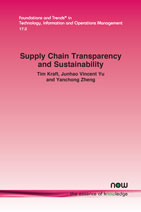Supply Chain Transparency and Sustainability
By Tim Kraft, Poole College of Management, North Carolina State University, USA, | Junhao Vincent Yu, Farmer School of Business, Miami University, USA, vincentyu@miamioh.edu | Yanchong Zheng, Sloan School of Management, Massachusetts Institute of Technology, USA, yanchong@mit.edu
Abstract
In the past few decades, social and environmental incidents in global supply chains have propelled supply chain transparency to become an increasingly important topic for firms. Multiple stakeholders, including consumers, regulators, investors, and activists, are all exerting pressures to compel or mandate firms to monitor social and environmental practices in their supply chains and disclose the related information to the public. Creating a transparent supply chain requires a firm to both gain visibility into its supply chain and disclose information to external stakeholders. Gaining visibility involves substantial investment of resources by a firm. Disclosing potentially sensitive social or environmental information comes with both risks and benefits. Because of the complexity entailed in both aspects, supply chain transparency becomes an emerging field of study for academic researchers. In this monograph, we examine and discuss the academic literature that investigates both the visibility and disclosure dimensions of supply chain transparency within the context of social and environmental responsibility. To present a clear picture of the research landscape for the operations management community, we focus our discussions on research from the behavioral and analytical modeling literature. By discussing some of the most representative and emerging studies in this space, we hope to highlight valuable research opportunities and inspire further research on the topic of supply chain transparency.
Supply Chain Transparency and Sustainability
Supply Chain Transparency and Sustainability examines the academic literature that investigates both the visibility and disclosure dimensions of supply chain transparency within the context of social and environmental responsibility. In order to present a clear picture of the research landscape for the operations management community, the discussions are focused on research from the behavioral and analytical modeling literature. The primary goal is to discuss the most representative and emerging works in this space so as to highlight future research directions and inspire more research on supply chain transparency. While supply chain transparency is a topic of relevance for many management contexts, this monograph focuses on its role in the context of sustainability. The monograph is organized as follows. First, there is a brief background on the topic of supply chain transparency. The authors then review the behavioral literature on supply chain transparency. This is then followed by a review of the analytical modeling literature that examines transparency-related contexts. Finally, the monograph concludes by discussing potential future research directions.
